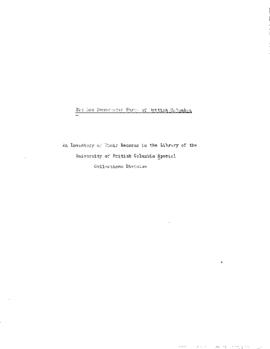Files in this subseries reflect the activities of the Women’s Rights Committee of the BC NDP, including its various subcommittees, committee liaisons, and coordination with the federal NDP Participation of Women Committee.
According to a 1992 document prepared by Anne Frost, past WRC Chair, and Charley Bersford, WRC Chair (“Women’s Rights Committee: Herstory”, 1992, in file 450-12), the Women’s Rights Committee was officially made a standing committee of the New Democratic Party of BC by a motion passed at Convention in 1971, building on previous women’s councils and federal women’s committees in the BC NDP and the CCF. The Committee’s mission statement in 1992 was “To guarantee fairness and equality for women in British Columbia; to address the roots of systemic discrimination and initiate legislation, services and programs to ensure women equal participation in all aspects of society; and to ensure access for all women to social justice” (“Mission Statement & Goals for Women’s Equality in a New Democratic Government,” WRC, spring 1992; in file 455-04). The Committee sought to achieve these goals through a variety of activities reflected in the files contained within this subseries, including authoring white papers on women’s issues, producing handbooks (such as the “Winning Nominations” handbook, created to assist women seeking to run for and win nominations in provincial elections; found in files 449-17 and 449-20), organizing workshops, producing and distributing a publication focused on women’s issues (entitled “Priorities” and launched in 1972; see for example file 450-05), introducing motions on gender-related issues at Convention, and more.
The Committee has its own executive structure, including Table Officers (Chair, Vice-Chair, Secretary, and Treasurer), Past-Chair, Priorities Coordinator, Democrat Page, POW Representative (the federal NDP women’s committee, known as Participation of Women), a Women’s Rights Organizer (WRC paid staff position), as well as regional representatives for the electoral constituencies, members at large, and representatives from and to other committees, such as the Young New Democrats, the Policy Review Committee, etc. Further, the WRC also formed its own subcommittees to engage with particular issues, such as the Nomination Support Committee, or the Committee on Sexist Behaviour. Like the BC NDP itself, these positions were generally elected at Convention, and “all women who are members in good standing of the B.C. New Democratic Party are eligible to attend Women’s Rights Committee Steering Committee meetings and have both voice and vote, except on money matters.” (“Women’s Rights Committee – Membership & Structure,” June 24, 1992; in file 450-07).
File 449-18 contains a copy of the “WRC Objectives -1992/93,” which gives a general sense of the goals and strategies of the WRC at the time, while file 456-05 contains the most recent draft constitution of the WRC included in this accrual (January 2003). Other materials in this subseries include meeting minutes and agenda, handwritten notes, correspondence, financial documents, reports, convention materials, memoranda and public communications, clippings, and other related materials.
